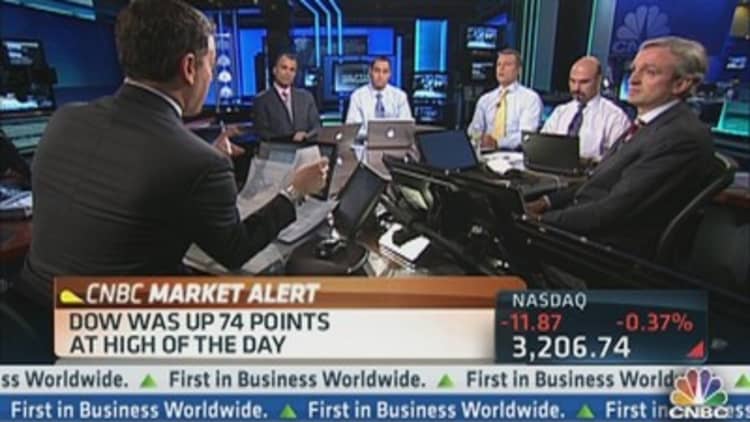The dollar and euro made their largest percentage gains against the yen since late 2008 on Thursday after the Bank of Japan surprised the markets with an ambitious plan to fight deflation in a radical overhaul of policy.
The dollar rose more than 3 percent and the euro more than 4 percent versus the yen after BOJ unleashed the world's most intense burst of monetary stimulus, promising to inject about $1.4 trillion into the economy in less than two years, a radical gamble that sent its bond yields to record lows.
Governor Haruhiko Kuroda, chairing his first policy meeting, committed the BOJ to open-ended asset buying and said the monetary base would nearly double to 270 trillion yen ($2.9 trillion) by the end of 2014.
(Read More: BOJ Throws in Kitchen Sink in War With Deflation)
"This is not your grandfather's BOJ," said Boris Schlossberg, managing director of FX Strategy at BK Asset Management in New York. "The fact that they came out, doubled the size of the QE and are willing to do all these non-conventional measures suggested that they really want to take dollar/yen to 100," he said.

The dollar rose as high as 96.41 yen on Reuters data, near a 3 1/2-year peak of 96.71 set on March 12. It was last trading at 96.26 yen, up 3.5 percent on the day and on track for its best day since October 2008.
The euro traded at 124.51, up 4.2 percent on the day, marking its biggest one-day move since November 2008. In the options market, three-month dollar/yen risk reversals, a broad gauge of currency market sentiment, remained biased toward puts, the right to sell dollars at a future date, but demand stood at its lowest level since March 11.
(Read More: The Buck Does Not Stop With ECB: Draghi)
"The BOJ announcement was more aggressive than almost anybody had expected," said Jens Nordvig, global head of FX strategy at Nomura Securities in New York. The anticipation of long-dated Japanese government bond purchases has already caused the Japanese yield curve to collapse.
"This sets the stage for asset allocation changes in coming months," he said. "We have been out of the yen trade in recent weeks, but we think another leg of yen weakness is in store as domestic asset managers start to shift in the new fiscal year, and on the back of unprecedented policy-aggressiveness by the BOJ."
Nomura Securities said given the weaker U.S. growth momentum lately, the dollar may not be the best currency to express yen weakness. Instead, the firm said it's buying the Australian dollar against the yen, targeting a move to 105 in two to three months.
Currencies
The BOJ's new plan means it will buy about 7 trillion yen ($73 billion) of bonds per month, equivalent to about 1.4 percent of gross domestic product. By comparison, the U.S. Federal Reserve is buying $85 billion of bonds per month, about 0.6 percent the size of the economy.
(Read More: Bank of Japan Policy Is Huge, Risky Experiment: Fund Manager)
Kuroda also said he would not hesitate to adjust policy further.
The yen also weakened against other currencies, with the Australian dollar rising above 100 yen for the first time since 2008.
Eyes on US Payrolls
The yen's direction in the near-term will depend on the U.S. nonfarm payrolls report, due on Friday. Employers likely added 200,000 jobs to their payrolls last month and the unemployment rate is seen steady at a four-year low of 7.7 percent, according to a Reuters poll.
A disappointing reading could keep U.S. bond yields depressed and add to expectations of more bond-buying from the Federal Reserve, which would pressure the dollar against the yen. Data showing weaker-than-expected growth in U.S. private-sector employment and initial jobless claims at four-month highs last week has fueled worries the labor market is losing momentum.
The euro rose versus the dollar, with gains accelerating in the afternoon as investors covered short positions, bets made on a currency falling, a trader said.
European Central Bank President Mario Draghi said the bank stood ready to act if growth continues to languish. He also affirmed his commitment to keeping the euro zone intact and said the Cyprus bailout was not a "template" for future rescues in the currency zone.
The rose as high as $1.2949, its highest since March 25. It last traded up 0.7 percent at $1.2938. according to Reuters data.

